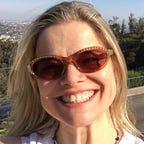Liz Hernandez: How to find your voice and advocate for people living with Alzheimer’s disease
Liz Hernandez, a correspondent for NBC’s Access Hollywood, was a featured speaker at the 2017 Alzheimer’s Association Advocacy Forum last month. Liz first became an advocate herself after her mom developed the disease two years ago, and she became her mother’s primary caregiver until she entered a full-time care facility. As Liz told the program participants, she was initially reluctant to talk too much about what was happening in her family in order to preserve the privacy of her mother and family. However, she eventually came to realize just how important it is to speak out. She is now actively involved in the Alzheimer’s Association, joining the “Celebrity Champions” campaign in 2016 and serving as a Key Spokesperson during Alzheimer’s & Brain Awareness Month. Smart Girls recently sat down with her to discuss the importance of becoming an advocate for Alzheimer’s disease.
Smart Girls: When you first became a caregiver for your mom, did you find yourself lost initially?
Liz Hernandez: Absolutely! There is no blueprint for this. There is no one to show you how it’s supposed to be done. You’re figuring it out as you go. But that’s why it’s so important to have a support group. I was very fortunate I had people take me under their wing that had been through this. The first time I attended an Alzheimer’s Walk, I understood that I wasn’t alone. You feel defeated at times. And then you meet with other people who have gone through the same journey and the fear subsides. You do a lot more then, once you are able to grasp that it’s going to be okay. For me, I was able to share my story and step up to advocate, because you don’t want people to feel that same fear or discouragement that you felt in the beginning.
SG: Alzheimer’s is often seen as an old person’s disease. How can we inspire more young people to get involved?
LH: Through more Forums like this with the Alzheimer’s Association. You meet so many young advocates, you start to realize that the people advocating are in their 20’s and 30’s and sometimes even younger.
SG: What words of encouragement do you have for those people who feel like everything surrounding Alzheimer’s is hopeless?
LH: This is a disease where people come together and they show their strength. They show their compassion. It’s building a community. And if anything, you can be a support to a friend, to a neighbor, to a sister, to a brother. You just never know.
And when you are creating a community of people that want to just be there to support each other, that’s a beautiful thing.
SG: What do you have to say to young women to get them involved in advocacy for Alzheimer’s?
LH: It’s very empowering because you want to be able to use your voice for good. We have to let [our government] know what it is that we care about. We feel sometimes that we don’t count or we don’t matter. But attending forums like this you realize that we do have a voice. Seeing so many people come together for something they truly care about, it shows you that we can make a big difference.
SG: What is your message for Latina young women and women of color about advocacy and Alzheimer’s? What is the best way to get involved?
LH: I always say the best way is through someone that you know. You never know who’s going to be affected. Alzheimer’s runs high within our communities. I found [others like me] just speaking to my girlfriends. Before you know it, someone knows someone who knows someone. And it’s important to rally behind each other. In the Latin culture, [talking about Alzheimer’s] seems a little taboo. But then you realize that there is strength and there is humility in speaking about it. Don’t be afraid to speak up. Especially, when it comes to knowing what the warning signs are. I wish I had known that. Right now, I share that with my girlfriends, even though they might never be affected by this disease. I make sure that I am constantly speaking out and talking to other people and informing them, through social media, especially.
Go attend a Walk. Go with your girlfriend. Go with a neighbor. Go with whoever. Be a support because you don’t realize how many lives you could be changing.
SG: How did becoming a caregiver change your life? How did it affect your career?
LH: I don’t want to say that it ever affected my career. It was taxing. It took a toll on me as far as energy. I’m so grateful that I had that opportunity. As my mother’s memories were fading, we were creating new memories. Memories that I will have for the rest of my life. And I’m so thankful. It’s such a selfless act to be able to care for the person who took care of you all those years, and it’s the greatest gift of love that you can give. I always say the most beautiful thing that you can give anybody is your time. And I am forever thankful. So really when I was being the caregiver, it was my Mom who was ultimately giving me the gift.
SG: What do you hope that people will take away from their experience here at the Advocacy Forum?
LH: A sense of community and empowerment. To know that we do truly have a voice and we can make a difference. And the more people that come together to help raise awareness to let our congressmen and women know that this is something we really care about and how it’s really affecting us and how it’s going to continue to affect us.
We have to show up for the people that we love. And we have to be their voice.
